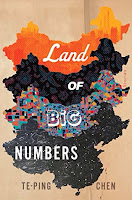My Rating: 5 stars
I've been reading quite a few new releases the last couple of months and while many of those I enjoyed immensely (majority have been 4 and 4.5 star reads thankfully), I had yet to come across one that I could truly categorize as a 5 star level "this book blew me away" type read (so far this year, I've rated 2 books 5 stars, but both were backlist reads). Well, heading into summer reading season, I'm happy to report that I've finally come across my first 5 star read among the plentiful 2023 new releases — Thao Thai's spectacular debut novel Banyan Moon (scheduled for publication in June).
There was so much to unpack with this book, I'm honestly not sure where to begin. Perhaps the best place to start would be what attracted me to this book in the first place — as soon as I read the premise, especially the following last paragraph, I knew that this was a book I abs had to read: Spanning decades and continents, from 1960s Vietnam to the wild swamplands of the Florida coast, Banyan Moon is a stunning and deeply moving story of mothers and daughters, the things we inherit, and the lives we choose to make out of that inheritance."
First of all, I love sweeping family sagas, but in particular, I'm drawn to stories about mother/daughter relationships. Part of the reason I gravitate toward these types of stories is because I have a complicated relationship with my own mother, so I'm constantly on the lookout for books that explore this — particularly between Asian mothers and daughters, as there are usually familiar cultural dynamics involved that inform these relationships, which can hopefully help me make sense of my own.
To be honest, reading this book was like a gut punch for me because I resonated so deeply with each of the 3 main characters — Minh (grandmother and family matriarch), Huong (Minh's daughter and Ann's mother), and Ann (Minh's granddaughter, Huong's daughter, and herself about to become a mother) — and the various misunderstandings and disagreements that defined their relationship with each other. I understood Ann's feeling of being adrift and floating and not really knowing what she wanted to do with her life, only that she wanted to escape from the perpetual tension that always existed when she was in her mother's presence. I also understood Huong's feelings of inadequacy — both as a mother and as a daughter — and feeling like she had no choice but to resign herself to a life that reflected what others wanted rather than what she actually wanted. And yes, I also understood Minh's struggle, why she became the overbearing force to be reckoned with in the family, and what necessitated her urge to protect her granddaughter at all costs. So many of the dynamics that were at play between these three women felt so familiar to me, as they reflected some of my experiences and struggles with my own family over the years: for instance: the inability to communicate our true feelings no matter how hard we try, and then being bogged down by endless guilt and regret that never truly goes away; the resentment and hurt built up from a lifetime of letting fear and desperation dictate our words and actions, resulting in us saying things to each other that we may not really mean, but that end up dealing irreparable damage to our relationships; and for me, this one was the most poignant and heartbreaking — the constant struggle with understanding the different ways to love someone and the impossibility of choosing a "right" or "wrong" way to love (especially where family is concerned). As an indication of how deeply this story resonated with me — during various points as I was reading, I actually had to set the book down in order to wipe away tears that seemed to appear of their own accord.
Another thing that blew me away with this book was the writing. I love beautiful prose and this one definitely had plenty of it! When I read fiction, I tend to read straight through without marking up any passages because I don't want to break up the flow of the story, but in this instance, I couldn't help myself — some of the passages, in articulating the complexities of the relationship between the 3 generations of Tran women, also described my own feelings so precisely that I just had to mark them for rereading and reflection later.
One other thing I wanted to mention is the format of the narrative, which, except for the first chapter, alternated between the perspectives of Minh, Huong, and Ann, both in the present day as well as going back to the past. This format was powerful, I felt, as juxtaposing the three women's stories in this way not only helped us see how each navigated her role as daughters (which is important because of how much these experiences shaped their future roles as mothers), but it also helped us to see how similar some of their motivations were, yet how differently their lives turned out based on the choices they made.
As I mentioned earlier, there is a lot to unpack with this one and the above only touches upon a few of my initial thoughts about certain aspects of the story that resonated with me, which of course only scratches the surface of what this book is about. This is why I'm so glad that one of my book clubs chose this as a monthly read, as I now have an excuse to go back and reread this in preparation for the discussion. Definitely looking forward to it!
Received ARC from Mariner Books via BookBrowse First Impressions program.


